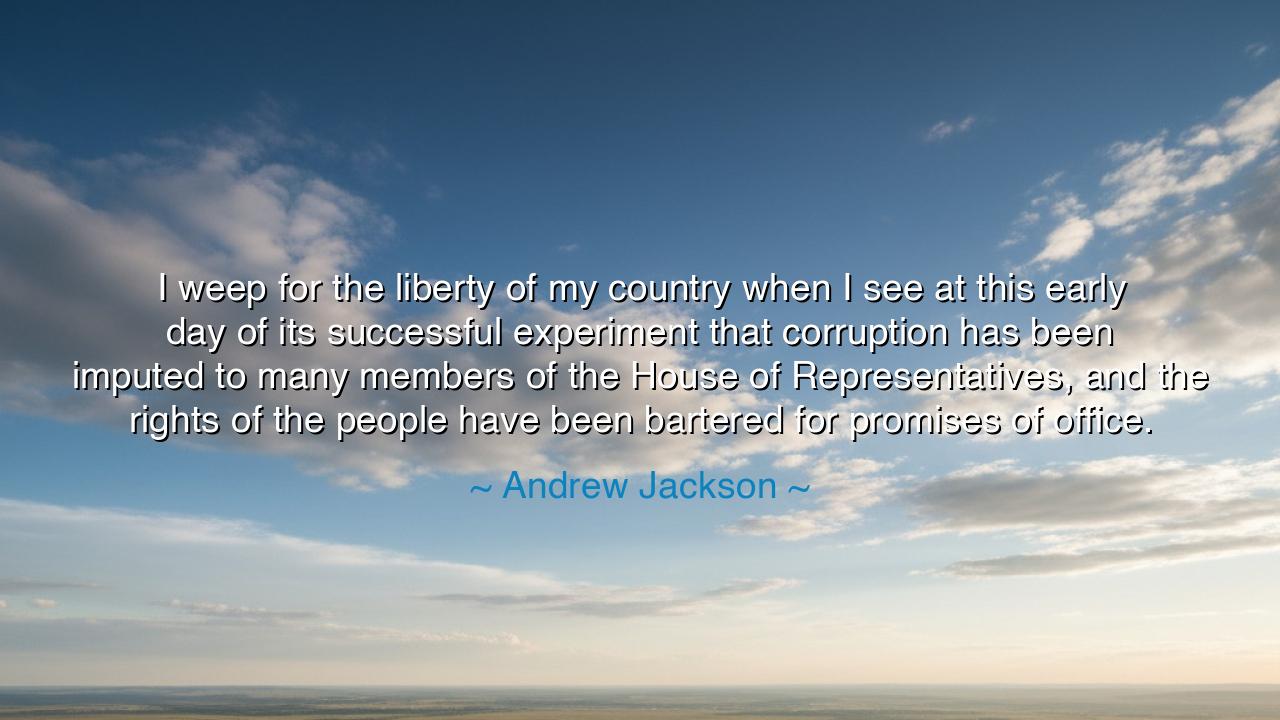
I weep for the liberty of my country when I see at this early
I weep for the liberty of my country when I see at this early day of its successful experiment that corruption has been imputed to many members of the House of Representatives, and the rights of the people have been bartered for promises of office.






The words of Andrew Jackson — “I weep for the liberty of my country when I see at this early day of its successful experiment that corruption has been imputed to many members of the House of Representatives, and the rights of the people have been bartered for promises of office.” — rise like a lamentation, the cry of a soldier turned statesman who loved the republic he had fought to defend. Spoken in the aftermath of the Election of 1824, these words capture Jackson’s anguish at what he believed was the betrayal of the people’s will through political bargaining and selfish ambition.
The meaning is both sorrowful and fierce. To weep for one’s country is not the act of weakness, but of devotion — a mourning for what is sacred when it is soiled by corruption. Jackson saw in the halls of government not the purity of the republic’s founding, but men willing to trade the rights of their people for private advantage. His warning is eternal: the greatest threat to liberty is not foreign invasion, but domestic betrayal by those entrusted with power.
History shows us the moment that gave birth to this cry. In 1824, Jackson won the popular vote and held the most electoral votes, yet the presidency was awarded to John Quincy Adams after what Jackson’s supporters called the “Corrupt Bargain.” Henry Clay, Speaker of the House, cast his influence in Adams’ favor and was soon named Secretary of State. To Jackson and to the common people, this looked like proof that the rights of the many had been bartered away for the advancement of the few.
The deeper truth Jackson spoke transcends his time. Democracies live not by constitutions alone, but by the integrity of those who guard them. When corruption seeps into the chambers of representation, the bond between people and government frays, and the trust that sustains liberty begins to die. His grief was not merely for one election, but for the possibility that the young republic might already be learning the ways of decay that had doomed other nations.
Let this wisdom be handed down: liberty must be guarded not only on battlefields but in legislatures, not only with swords but with integrity. The temptation to barter away the people’s rights for personal power is as old as government itself, and as dangerous as any foreign foe. Jackson’s tears were a warning to every generation: we must be vigilant, for when corruption is allowed to flourish, the republic itself is betrayed, and the freedom of the people becomes but a memory.






LNLinh Nguyen
Andrew Jackson seems to be suggesting that corruption can start early in a nation's history, even before its political system is fully mature. Is this something that only applies to the early years of a republic, or can any democratic system fall victim to such practices over time?
TTThang Tran
It's unsettling to think that this quote could still apply to today's political landscape. Are we witnessing the same kind of corruption now that Jackson condemned back then? Does the promise of office still overshadow the rights of the people in contemporary politics?
Ccho
What does Jackson mean when he weeps for liberty? Could he be warning us that corruption erodes not just politics but the very freedoms that form the basis of a republic? Is there a way to combat this, or do we risk repeating history over and over again?
VTLong Van Thanh
Is the idea of corruption in politics inevitable, especially in representative democracies? This quote makes me wonder whether the balance of power in government is always at risk of exploitation. When office positions are promised as a form of trade, are we jeopardizing the foundational principles of freedom and democracy?
HPhoa phan
What are the long-term effects of corruption on a country's democracy? Andrew Jackson seems to have predicted the cycle of power struggles and corruption that can occur when promises are made in exchange for office. Is this something we still see in modern politics? How can societies protect the rights of the people against such bartering of power?